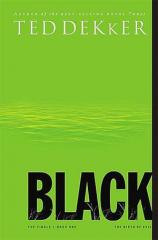Black: A Trilogy, Book One
Review
Black: A Trilogy, Book One
Thomas Hunter's ordeal begins on a rooftop, where he seeks refuge after being chased by unknown pursuers in an industrial area of Denver. The world he knows fades to black at the sound of a gunshot --- and when Hunter comes around to consciousness again, he does so in a world as unlike the city he left as any place could be. From that point on, every time Hunter falls asleep in one reality, he wakes up in the other.
Eventually, in the futuristic new reality, Hunter is warned about a deadly virus that is about to be --- or rather, given the time frame, has been --- unleashed on the world in his other reality. With the assistance of his skeptical but medically knowledgeable sister, Hunter sets off on a mission to stop the unwitting manufacturers of the virus, who are the pawns in an international ploy that places the survival of the planet's entire population in the hands of a few power-hungry men who know the formula for the only thing that will stop the spread of the fatal disease.
One of Hunter's first stops on his mission is the offices of the Centers for Disease Control in Atlanta, and it's also one of the first places where the book begins to falter. As authentic as the setting is, the whole situation loses its credibility because of one fact: Hunter's visit to the CDC takes place on a Saturday, and there is no way on earth a government agency like the CDC is open on the weekend. (Trust me. I called.) We know it's a Saturday, by the way, because the Kentucky Derby is being run that day, which has more bearing on the plot than you might think.
What is credible is Hunter's absolute belief that the future reality is the real reality, and that his Denver-Atlanta-and-eventually-Bangkok world is his dream world. That may seem like a stretch, except to those people whose dreams are so real that they are absolutely convinced, while they're dreaming, that they're not dreaming. Like Hunter, some of us experience a dream world that is utterly tangible.
In this other reality, Hunter is regularly given clues that will help him in his effort to stop the release of the airborne virus into the environment. I suspect Dekker has been reading John Eldredge lately, because he gives Hunter a mission that contains all the elements of a WILD AT HEART quest, right down to rescuing the "beauty." In the future reality, the playful beauty not only wants Hunter to rescue her but also controls the way he is to do it, to a point. In present-day reality, the beauty's very survival depends on being rescued.
BLACK is the first of a three-part trilogy and thus ends with something of a cliffhanger. (The other two titles, RED and WHITE, are scheduled for release between now and September.) But the problem with fantasy is this: Once the reader knows that natural laws no longer apply, the suspense begins to dissipate. So when a guy is shot at point-blank range, well, it tends to not mean a whole lot.
Dekker fans, particularly those who are into fantasy and especially those who don't mind less-than-subtle salvation imagery, will likely consider this to be one of his better books, if not his best. And the alternate reality motif does work well in BLACK. But in an anything-goes fantasy world, disbelief becomes permanently suspended --- along with any sense of impending danger.
Reviewed by Marcia Ford on February 11, 2004




